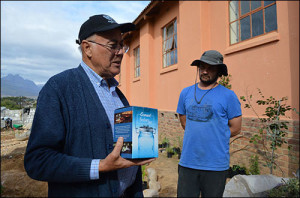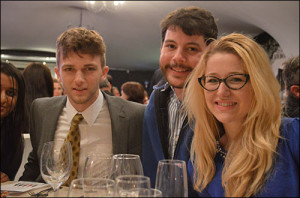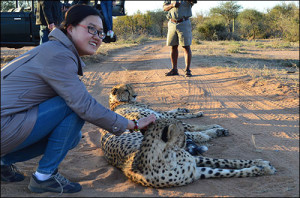8 Students Document Living History During South Africa Reporting Trip

The Journalists Capture the Stories of Those who Lived During Apartheid
Columbia, Mo. (June 29, 2015) — Eight Missouri School of Journalism students recently returned from a three-week trip to South Africa this month after completing journalism projects about the struggle against apartheid.
The students, who were led by Professor Randall Smith, the Donald W. Reynolds Endowed Chair in Business Journalism, spent time at the University of Western Cape in Cape Town, South Africa, from May 17 to June 8. Mizzou Advantage, the Center for the Digital Globe and the U.S. Embassy in South Africa provided partial funding for the trip.
The focus of the trip is to bring story telling to documents that are housed in the Mayibuye Center, the home of an immense collection of apartheid archives at the university. The University of Missouri has a 30-year relationship with the University of Western Cape, which was at the center of the apartheid struggle.
This is the second year of the trip, and some of the work of the students can be found at the Mayibuye Archive website.
| The Mayibuye Archive
South Africa’s largest archive on the struggle for freedom. Missouri School of Journalism students report on the stories contained in these historic documents. Among them are the following: South Africa’s Educational System: Stephanie Ebbs shares how schools became a site for struggle in South Africa, especially after a heavily publicized student protest in Soweto in 1976 turned violent. Students organized mass protests and boycotts of the racial system and police would interfere or close schools to arrest politically active students or teachers. Black Diamonds: An emerging class of blacks, labeled “Black Diamonds” by TNS Research Surveys and the UCT Unilever Institute in 2006, has removed its shackles from centuries of oppression and found success as entrepreneurs, politicians, and educators. Having achieved prosperity, reporter Elliott Stam asks, what do these so-called “Black Diamonds” owe to their communities and to their country? Mandela Moments: In every interview, the Missouri journalism students asked what the interviewee’s favorite “Mandela Moment” was. They heard intimate stories from Mandela’s bodyguard, his fellow activists and the Australian photographer that took the leader’s last pictures. |
Smith said the experience allows students a unique opportunity to document living history.
“Our project is really a race against time,” Smith said. “Those who lived through apartheid are in their latter years. Their experience is one that the world must remember. But that won’t happen if journalists don’t capture their stories.”
With the help of UWC faculty, the students interviewed more than 40 leaders and activists and spent time examining historical documents. The students also saw two former South African presidents speak during the trip and went to Parliament to hear the current president, Jacob Zuma. Harold Herman, dean emeritus of the Faculty of Education at UWC and who was an active voice in the anti-apartheid movement, helped arrange interviews for the three-week trip.

The group of undergraduate and graduate journalism and business students will receive three journalism credits for their work.
Senior journalism student Ryan Collins completed an in-depth project about the effectiveness of post-apartheid economic policy. He said South Africa became a home away from home for him during the three-week trip.
“It is a gorgeous country with beautiful lands and breathtaking people,” Collins said. “Its politics is just as unique as its geography. It is consumed by the past too much and is trying to spin itself into the future too fast, causing problems. It has enormous potential and is so close to fulfilling it.”
Journalism graduate student Linly Lin, who completed a project about the future of renewable energy in South Africa, felt a similar connection to the country. She said her favorite memory was interviewing a group of women at an area township.
During apartheid, hundreds of thousands of people were classified according to race and forcibly relocated to slums, known as townships, outside the city limits.

“This area, like many other exclusive black residences, witnessed the unfolding of apartheid,” Lin said. “Deprivations of electricity, food, infrastructure and everything suppressed people’s life here, but the church ladies, in their sixties and seventies, told me they had to persevere and struggle to survive. Faith and belief helped them to keep living. I see from everybody living in the shacks that life is so beautiful.”
At the end of the interview, the women called Lin “sister” and hugged her goodbye.
“The whole series of lectures and student reporting projects exposed me to all facets of the society,” Lin said. “I realized that all societies are similar, reflecting each other’s problems and solutions. At the end of the day, people are people. Looking into another society, I can understand my own much better.”
Updated: September 10, 2020